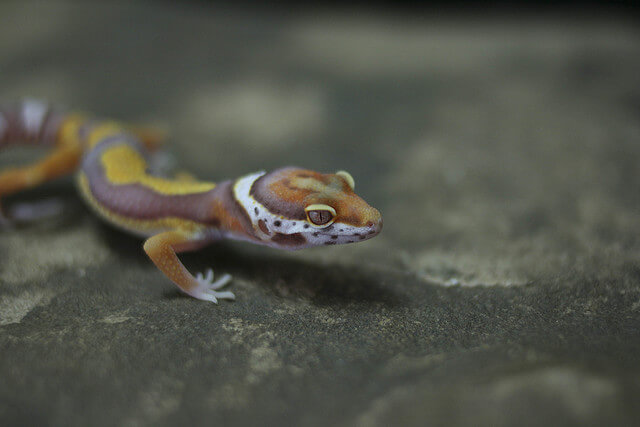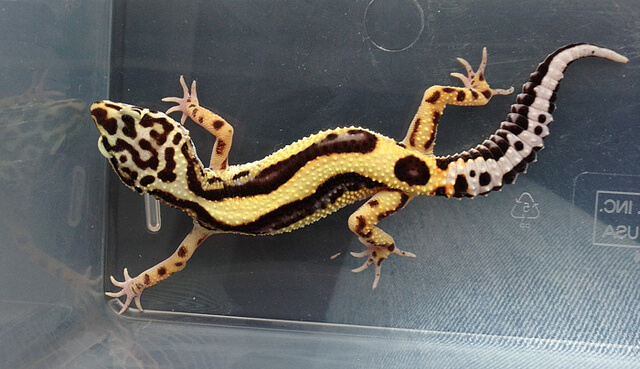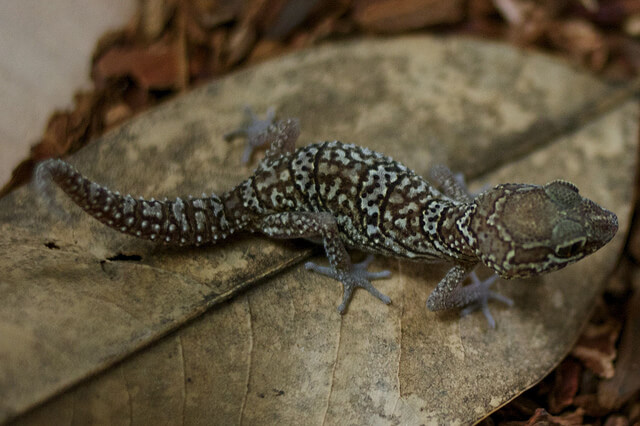In January, Gecko Time published an article titled “Selling Rare Geckos” where we asked breeders of geckos that few people keep in captivity about their success in selling the offspring. Surprisingly to us, the breeders who responded had no problems. This led us to wonder how breeders who produce and sell the more popular geckos species are faring. Frequently prospective breeders of leopard geckos and crested geckos are warned that “the market is flooded”, “you’ll never be able to sell them”. How true is this? Five breeders of leopard and crested geckos have responded to the following questions:
How many leopard and/or crested geckos do you produce in an average season?
What is your price range?
How and where do you advertise them? What strategies do you use?
Where do you sell most of your geckos?
How successful are you in selling the offspring?
Who purchases these geckos?
Have you changed your breeding plans at all based on your ability to sell them?
Do you have any further thoughts to share about selling leopard and crested geckos and the market?

Rob Delaney and Raquel Levesque of Delaney’s Geckos
Each season, we increase the number of offspring we produce. Last season, Delaney’s Geckos produced around 150 leopard geckos and 50 crested geckos. For 2015, we anticipate to produce over 225 leopard geckos and 75 crested geckos
Delaney’s Geckos prices range anywhere from 20.00 per animal all the way up to 500.00 per animal.
Delaney’s Geckos currently tends to do the majority of our advertising via Facebook. We will also attend local reptile expos, post ads in popular reptile forums and handle local sales with reputable reptile shops who purchase from us.
Our sales are mostly through Facebook. We have a lot of returning customers each season who purchase multiple group lots. If there were more shows in New England, I could see us doing more sales at the expos than internet sales.
With the 200 plus animals Delaney’s Geckos produced last season, we held back about 20 and have sold the remaining geckos successfully.
Delaney’s Geckos is most successful selling offspring to other breeders around the United States as well as internationally. We also do well selling to our local reptile shops.
Both partners at Delaney’s Geckos work full time jobs so we only produce what we can manage successfully. Each Season, we try to produce a little bit more then the previous year but never get in over our heads.
My recommendation for anyone thinking about getting into the hobby of breeding and selling animals of any type is to do your research to the absolute fullest. Don’t be scared to ask questions; there are a lot of kind individuals in the reptile community. Consider all of the costs and keep in the back of your mind that these animals may require vet visits. You can’t rush into this hobby thinking you are going to get rich. You need to build up a positive reputation before the market will play in your favor. If you don’t rely on this hobby for an income, it’s an absolutely rewarding and satisfying journey that you will need to experience for yourself to truly understand.
Kristi Housman of Ghoulish Geckos
My gecko production seasons vary a lot. Generally I would guess that I only produce about 50 leopard geckos a season. Last season was pretty small with only about 25 produced.
For the most part I sell my geckos at $100-$400. There are always a few cheaper ones and eventually there will be some higher priced ones.
I generally list my geckos on Facebook, geckoforums.net, faunaclassifieds, and The Reptile Report Marketplace. I really don’t have any strategies and just try to list them as many places as I can.
I sell most of my geckos online. I have never done a show yet, but that’s always possible in the future. Most of my sales are geckos that are shipped, but I do sell a few locally (still online).
I generally sell out every season. I do still have some geckos left from last season, but they were mostly late season hatches. I don’t advertise as much in the winter since I can’t ship. I’m hoping the rest sell as soon as it warms up.
My geckos are mostly purchased by other breeders, but sometimes it’s just someone looking for a pet. I think the majority are people already breeding or looking into breeding in the near future.
I do try to pay attention to which morphs sell best when I plan my breeding season, and I’ve cut down on projects when sales were lower. But for the most part, I continue to breed what interests me most.
Here’s my advice about selling leopard geckos: When you’re looking to sell online, try to price right around the middle of the market, especially if you’re newer. Don’t try to list geckos super cheap because it brings the market down and other breeders who put in a lot of work get hurt. Also, don’t expect to get the same prices as breeders who have been around a long time. I’m going into my 8th season and I still don’t get those prices. You will get there if you work hard and are honest. It just takes time.

Samantha Harrison of Samantha’s Geckos
My crested gecko production has varied widely. My first couple of seasons, I only bred a couple of females so I only had about 12 babies each of those seasons. The following year, I had about 40 hatchlings. A couple of years ago, I bred 6 females intentionally and purchased several more intending to use them for projects the following year but they were all gravid when I received them so I had almost 100 hatchlings that year! This past year I kept it to a much more reasonable 40-50 and that’s what I plan to stick to.
My prices range from about $30 for pet quality up to about $200 for excellent breeder quality juveniles or nice females. Most geckos that I sell are in the $50-$80 range though.
I advertise on Fauna, my own website, and recently more and more on Facebook. I occasionally will post on Pangea as well. I also sell them at local reptile expos in Maine, New Hampshire, and Massachusetts. I don’t really have any specific strategies besides trying to get the best quality photos that I can in the ads and to keep my production low enough that I know about the individual personalities, habits, favorite diets, hatch dates, and current weights of the geckos. That allows me to answer those questions that many customers have about their potential pets. Customer service is very important.
My sales have really been 50/50 as far as expos vs. online. I tend to bring the pet quality geckos to the expos and keep the nicest ones at home to photograph and sell online because those are very different markets. Different expos are different as well. There are some that I would only bring pet quality geckos to because the customers are really only looking for pets and there are a couple that I bring the nicer ones to because people are looking for future breeders or they just want nicer morphs for their collection. I get a lot of sales from repeat customers as well.
It really depends on the time of year but I’ve generally been pretty successful in selling the offspring. Sometimes if I have a few that aren’t selling for a while, I take them off the market for a few months to allow them to mature and show more of their coloring and pattern and then re-list them. This has always worked well for me. Expos are very “hit and miss” I have found. Sometimes, I’ll be there all day and only sell a couple of geckos and other times, I’ll sell almost every gecko that I have with me.
At expos, the buyers are often young adults wanting a cool pet or parents wanting a pet for their children. They tend to be new to owning geckos or even reptiles at all so quite a bit of discussion and educating (and screening) are important when selling at an expo. There are some collectors and future/current breeders as well. Online, it has more often been breeders or collectors. Online customers are usually more knowledgeable in my experience. Perhaps because learning how to even go about purchasing a gecko online would take a little bit of research rather than taking the easy approach of picking something out at a pet store.
I have changed my breeding plans based on sales a little bit. The market is becoming saturated with crested geckos so I am pickier about my projects and am careful to keep my numbers reasonable in case they stop selling. I don’t want to become overwhelmed with geckos if the market completely crashes. The biggest change is that I used to make sure to breed one or two pairs specifically for pet quality geckos to sell inexpensively at expos. Now, nicer geckos that would have been mid-range before are selling for pet quality prices so my goal is to produce the nicest geckos that I can and I still end up with enough inexpensive ones to sell at the expos.
I think people need to watch the trends in the market and be very careful about how many geckos they choose to breed. Crested geckos are very prolific and easy to breed so there is a huge supply of them available. Right now, demand is still high so while it is getting tougher to sell them, it’s not too bad yet. If that demand drops off while the supply keeps increasing, things will become very difficult and people may find themselves stuck with larger numbers of geckos than they are able to care for properly.
Ashley and Jamie Morway of Morway Geckos
We produce 20 to 30 crested geckos a season. Our price range is $35 to $200.The $35 is for the more common colors and they are usually young around 4 months old (I will not sell a baby before 4 months old).The $200 is for the best of the best. I usually only have 2 or 3 of these a season. I do not do a lot of advertising. I use and have a Facebook page. Facebook is the best free advertising out there. AlsoI sell by word of mouth. I sell in the local area (I believe I am the only breeder). We sell most of our geckos at the local reptile expo (New England Reptile Expo).We go to all 3 shows they have a year. We are very successful in selling all the crested geckos we produce. I believe this is because we produce on a small scale and our prices are very competitive. We sell mostly to people looking for pets. I will take some time and help the new pet owner out with any questions. Also I give my info so they can ask questions later. I will be adding 1 or 2 females this or next year so I can produce a few more babies. I just want to say to anyone wanting to get into breeding geckos,that it is not always joy. I was very saddened last year when a baby was born with health problems. She is super cute but has problems getting around. When she gets older we will be building her a custom cage. We hope she will be comfortable here with us for life.

Aliza Arzt of Geckcessories
I’ve been breeding leopard geckos for 10 years and currently produce about 50-60 a year. I tend to price my geckos on the lower end: most of them sell for $35-65 with some of the nicest selling for up to $100. I unfortunately produce a few each season with minor defects such as kinked tails. These are sold as “pet only” for $20-25.
My geckos are advertised primarily on my website. I also attend as many as 6 reptile expos each year, primarily in New England, but occasionally as far away as New York. Most years I have sold all my available geckos by January or February. As this goes to press, I have 4 more to sell. I would say that the buyers are about evenly distributed between people looking for their first reptile pets and breeders or prospective breeders looking for geckos with known genetics.
I will confess that every year I worry that I’ll be left with 30 unsold geckos as the new season starts, especially when I still have a lot left in December. This worry was exacerbated a few years ago when the sales at reptile expos, which has been my primary venue, went way down. In addition, I’ve been disappointed to see leopard geckos at shows selling for as low as $10 each. It has taken until this writing for me to understand that people have not stopped buying leopard geckos, rather, the means of selling them has changed.
Most of my geckos are sold locally in New England, though I will ship if necessary. I’m a new (and somewhat reluctant) Facebook user and it seems that Facebook, especially local classified groups, is the way to go.
Another strategy that has worked very well is for me to actively seek out buyers through the internet. I have had a number of people purchase geckos from me who advertised on Craigslist that they were looking to buy (I don’t advertise my geckos on Craigslist because technically it is for adoptions only and I’m not re-homing my geckos, I’m selling them). Last season I shipped 30 geckos to a pet store that had advertised on Kingsnake that they were looking to buy gecko groups.
I am limited in the types of leopard geckos I produce because of space and time limitations, as well as my unwillingness to regularly swap out breeding stock. I have a much greater turnover of my female breeders due to retirement from age or poor production, but I have been breeding with the same 4 males for at least the past 5 years.
For the past few years I have bred 8 females and 4 males. This year I decided to cut back a bit and am breeding 5 females to the 4 males.
The best advice I can give to someone considering breeding is to start small. I started with 1 males and 2 females in 2005 and produced 13 offspring. Even if a new breeder is able to produce and sell 50 leopard geckos, the amount of time it takes to properly care for all those babies at the height of baby season can make it much less attractive the next year. Pace yourself for best success.
About our Contributors
Rob Delaney and Raquel Levesque operate Delaney’s Geckos. Both partners have owned reptiles since childhood but have been breeding geckos specifically since 2011.
Kristi Housman runs Ghoulish Geckos and has been breeding for 7+ years. She mostly works with eclipse, but has many other morphs/projects, too. Kristi also keeps and breeds other lizards. Last season she successfully bred yellow ackies for the first time.
Samantha Harrison is a crested gecko breeder based in southern Maine. She has been breeding geckos for several years primarily as a hobby. Her love of reptiles began when her parents surprised her with an iguana for her 9th birthday and she has been hooked ever since. She enjoys going to all of the local reptile expos in Maine, Massachusetts, and New Hampshire. She has converted her previously squeamish husband into a reptile fan and hopes to do the same with her infant son in a few years.
Ashley and Jamie Morway started Morway Gecko 3 years ago. They started as pet owners of crested and gargoyle geckos. They wanted to share the joy of owning one of these little buggers So they started Morway Gecko.They are a hobby breeder, looking to produce healthy and well adjusted baby geckos.


hey guy, i have gecko’s and i want to sell this. And i don’t know where do i sell.. .Pls. help me..
Facebook, craigslislt, classifieds, reptile forums, friends and family.
Not here.